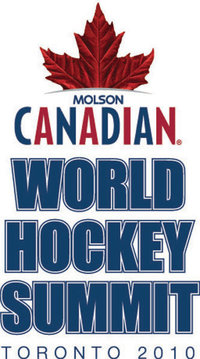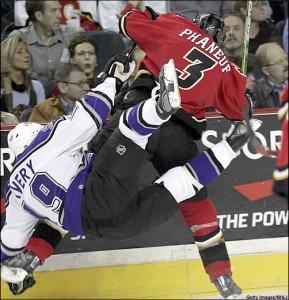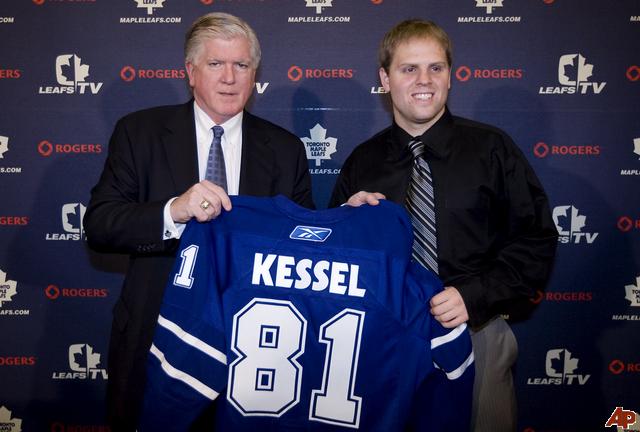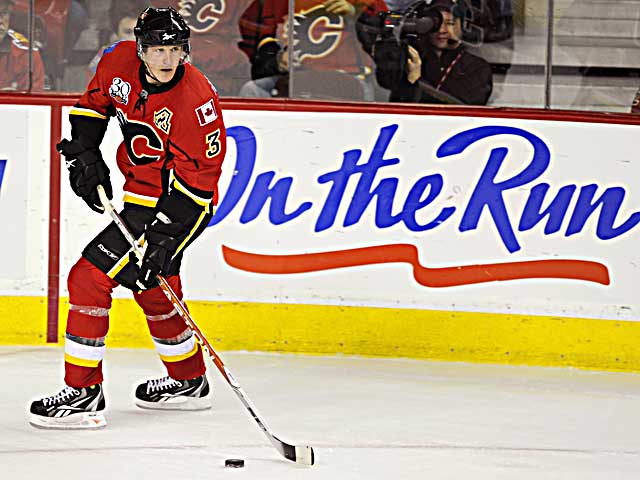World Hockey Summit: Day 3
 Debate over the National Hockey League’s role in international hockey, especially the Winter Olympics, built to a crescendo at the World Hockey Summit yesterday.
Debate over the National Hockey League’s role in international hockey, especially the Winter Olympics, built to a crescendo at the World Hockey Summit yesterday.
International Ice Hockey Federation President Rene Fasel had started thumping the war drums on Tuesday when he warned the NHL that they would expand to Europe “over his dead body”.
During that same question and answer session with TSN’s Gord Miller he called for professional hockey players to play at the 2014 Winter Olympics at Sochi, Russia.
Wednesday morning there was an evaluation of the 2010 Olympics, with Fasel, Vancouver Organizing Committee CEO John Furlong and International OIympic Committee member Timo Lumme speaking about the great success and popularity of hockey at this year's Games.
All three emphasized that the 114 million worldwide viewers of the USA-Canada men’s hockey final had been drawn, in part, by the fact that it was a best-on-best game that featured NHLers.
After the keynotes were done, Miller, acting as moderator, allowed IIHF member Igor Kuperman, sports marketing guru Brian Cooper, Detroit Red Wings general manager Ken Holland, Ottawa Senators captain Daniel Alfredsson and New Jersey Devils captain Jamie Langenbrunner to respond.
Not surprisingly, all five panellists supported the NHL’s return to the Olympics, with only Holland showing any kind of hesitation. The successful GM had many concerns about scheduling and injury issues affecting the success and health of his professional club.
When discussion broke out amongst the hundreds of delegates in attendance, there was an easy consensus that the NHL and Olympics need each other for the fans and the good of the game.
After lunch, NHL Commissioner Gary Bettman had a Q+A with TSN’s Pierre Maguire. During the interview Bettman repeatedly said there were pros and cons to sending his players to Sochi.
“We haven’t said ‘no,’” said Bettman. “And anybody who suggests that we’ve made a decision or suggests I’m anti-Olympics doesn’t get it, because what we’ve been simply saying is, ‘it’s a mixed bag.’”
Bettman stressed that he was commissioner when the NHL first started playing in the Olympics at Nagano, Japan, four cycles ago and that he has always been interested in exposing the sport to as many people as possible.
Many had expected that Bettman’s half-hour session was going to be the most heated event of the day. However, it was the follow-up discussion of a Global Event Agenda that was really contentious.
Moderated by Darren Dreger, the panel began with a thoughtful presentation by Edmonton Oilers associate coach Ralph Krueger, who had served as head coach of the Swiss national team at the Vancouver Olympics.
Krueger proposed a new schedule for international events, featuring the Olympics every four years, a World Hockey Championship during the intervening years and an under-23 world championship during Olympic years.
He also suggested that the Victoria Cup, an annual club championship between two European teams and two NHL teams, should be revived.
Miller then opened the floor to the panel of NHL Deputy Commissioner Bill Daly, Kontinental Hockey League President Alexander Medvedev, Team USA and Toronto Maple Leafs GM Brian Burke, NHL alum Anders Hedberg, former NHL goaltender and prominent NHLPA member Glenn Healy, NHLPA representative Mike Ouellet and IIHF member and broadcaster Paul Romanuk.
Although things began reasonably as each panellist said their piece, Fireworks ensued when they had the chance to rebut each other.
Generally speaking, Burke and Daly presented the case for the NHL staying out of the Olympics, highlighting that it put teams’ assets – the players – at considerable risk of injury. They were also concerned that the interruption in the professional season damaged the momentum of small-market teams.
“The Olympics don’t hurt the Toronto Maple Leafs, it doesn’t hurt our business model,” said Burke, the former GM of the Mighty Ducks. “But in Anaheim it does. In Nashville, it does. In Florida, it does.”
They were opposed by Healy and Ouellet, who as representatives of the players’ association, felt that their constituency should be allowed to play when and where they wanted, and that practically all NHLers would love to play at the Olympics.
Panellists outside of the labour politics of the NHL like Medvedev, Hedberg and Romanuk also chimed in with their concerns, although all three were adamant that the Olympics should be a “best-on-best” tournament.
The debate laid bare many of the tensions at the highest levels of hockey.
Everything from the ongoing labour disputes between the NHL and NHLPA, the lack of communication between the NHL and IIHF, the competing styles and values of European and North American hockey as well as the emergence of the KHL as a threat to NHL supremacy were all on display.
There were many dramatic moments, including Healy wondering aloud why Burke cared so much about when the World Hockey Championships were scheduled, since the Maple Leafs are always available when the tournament begins in April.
Alliances also shifted quickly in the swirling debate. When a doctor from the IIHF spoke from the floor to correct Healy’s impression that the quality of medical care provided at the Olympics is sub-par, the former Toronto goaltender saw his nemesis Burke leap to his defence.
Similarly, when another delegate called out Burke and Daly saying that it was a simple issue and that he was sick of hearing excuses about NHLers playing in the Olympics, Ouellet and Healy both allowed that it was a complex issue.
Burke was the most energetic debater throughout, taking on all comers from the stage and the floor of delegates, although Daly, Ouellet and Healy were very active as well. It was an exciting and intriguing show that had delegates buzzing for the rest of the day.
Today’s topics will be Women’s Hockey in the morning and Growing Participation. It’s hard to imagine that those panels will be nearly as heated, but you never know.
Toronto Maple Leafs take a big step forward by adding Phaneuf and Giguere
As everyone in the hockey world has heard, Brian Burke completed two massive trades Sunday with the Calgary Flames and Anaheim Ducks. Dion Phaneuf and Jean-Sebastien Giguere are the biggest acquisitions made by a Leafs team that looks drastically different from the version that took the ice against the New Jersey Devils Saturday night.
Both trades are intriguing, re-arranging Toronto’s salary cap and improving the Maple Leafs on-ice product in three major ways.
1. Dion Phaneuf adds depth to the Leafs’ blue-line.
Phaneuf was the best player involved in the trade with Calgary. I know it’s a saying that’s been repeated a lot in the wake of these deals, but that doesn’t make it untrue. On paper, Toronto has a fantastic defensive corps with Tomas Kaberle, Francois Beauchemin, Mike Komisarek, Luke Schenn, Carl Gunnarson and now Phaneuf.
The 6’3, 214 pound native of Edmonton will be the kind of physical presence that the Leafs are trying to trademark. Phaneuf will also help Toronto flesh out its power play. Best of all, he’s just 24, meaning he’s got at least a decade left in his career. Definitely a win for Burke.
2. Getting rid of Jason Blake’s outrageously bad shot selection.
Most people have focused on dropping Blake’s 4.5 million per season, but coach Ron Wilson must be thrilled to have the phrases “Blake takes a wristshot from the faceoff circle” and “Blake with the wrap-around attempt” removed from Toronto’s television broadcasts.
The statistics are telling: in the past three years he’s taken 804 shots on goal, scoring 50 times. That’s a 6.2% success rate, folks. Put another way, in his time with the Leafs Blake averaged nearly 4 shots a game, but put the puck in the back of the net once every four games. Think of all the turnovers in that other 75% of games where he was off the mark. If that’s not addition by subtraction, I don't know what is.
3. Jean-Sebastien Giguere is a big improvement over Vesa Toskala.
Giguere has been to the Stanley Cup final twice and won the whole thing a couple of years ago. Although he’s struggled of late, reuniting with goalie coach Francois Allaire should put him on the right path again. In any event, Giggy can definitely be a starting goaltender and also mentor Jonas Gustavsson.
And, you know, it’s best to move on from this beauty:
The one drawback of these deals is the departure of Niklas Hagman, who was Toronto’s best two-way forward. He was the team’s most consistent scorer and always showed a lot of grit on the ice.
However, the good far outweighs the bad for the Toronto Maple Leafs on these trades, and Burke has made some serious moves that will improve Toronto next season without giving up any draft picks, prospects or cap space. Sunday was definitely a banner day in Leafs nation.
Toronto Maple Leafs make huge changes
 It's come out today that Toronto Maple Leafs General Manager Brian Burke has shaken up his team, making two big trades.
It's come out today that Toronto Maple Leafs General Manager Brian Burke has shaken up his team, making two big trades.
First, he sent Slovenian heart-throb Matt Stajan, Ian White, Jamal Mayers and Niklas Hagman to the Calgary Flames for Dion Phaneuf, Fredrik Sjostrom and Keith Aulie.
Then, he sent Vesa Toskala and Jason "Johnny Wristshot" Blake to the Anaheim Ducks for J-S Giguere.
I've got to head off to work shortly, so extensive commentary will have to wait until tomorrow. Right now, it's hard to tell if the Leafs are better or worse, but they are certainly different.
Phil Kessel cost the Leafs too much
 The Toronto Maple Leafs edged the Nashville Predators 4-3 Monday night, getting a late game-winning goal from young Phil Kessel, Brian Burke’s shiny acquisition, the cornerstone of the Age of Truculence.
The Toronto Maple Leafs edged the Nashville Predators 4-3 Monday night, getting a late game-winning goal from young Phil Kessel, Brian Burke’s shiny acquisition, the cornerstone of the Age of Truculence.
Since he started playing for the Leafs (about six weeks after the trade that brought him to Toronto from Boston) he has scored 15 goals and 13 assists, and is easily the best player on the Leafs.
But I think the trade has been a terrible mistake. He doesn’t have enough help on the ice, he’s not a franchise player, and ultimately, the price was too high for Toronto.
Don’t get me wrong, he is a great player. He finds open space, sees plays developing and makes intelligent decisions with the puck. He can score from anywhere in the offensive zone and demands that the other team cover him tightly, giving his teammates room to breathe.
Unfortunately, his teammates don’t seem to know what to do with that space. As a result, opposing defences have begun to take advantage of the Leafs lack of depth. They have, as defensive coaches say, begun to cheat on Kessel.
Defensive strategy relies heavily on reactive responses to an offence. Obviously, a good defence reacts to where the puck is, where the players are. But because Toronto does not have a strong secondary scoring threat, defences have taken to sealing off Kessel as soon as he’s on the ice. They know that should he pass the puck, the Leafs probably aren’t going to be able to score.
Now, there are some players who would be able to overcome that, who could make the players around them better. The kind of players that only need to be identified by their surnames: Gretzky, Lemieux, Crosby, Ovechkin, Brodeur, Roy. Unfortunately, Kessel just doesn’t belong there. He’s a very good hockey player, but his shoulders aren’t broad enough to carry an entire franchise.
And that, ultimately, is why trading two first round picks and a second round pick was too much for Kessel.
That’s an awfully high price, jeopardizing the Leafs for the next five or more years. Frankly, I’m not sure that I’d trade that much for any of the franchise players mentioned above, let alone Phil Kessel.
With the Leafs toiling near the bottom of the standings, the trade looks even worse. There’s a good chance that the division rival Boston Bruins landed themselves a top three pick that could mean Taylor Hall or Tyler Seguin, both quality players that would’ve helped the Leafs considerably, and at the rookie maximum salary instead of Kessel’s $27 million over five years.
When there were rumours that Toronto was going to trade with the Boston Bruins, that Burke might land Kessel, a proven sniper, I was ecstatic. At last, the Leafs were going to start to turn it around. Most people I knew thought that too, but my good friend Ruben and my dad both held out, saying that it was a bad trade. It took me a while, but now I see it too. Phil Kessel is a quality player, but the price the Maple Leafs paid was way too high.
